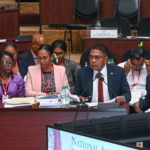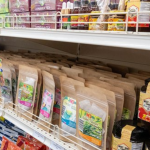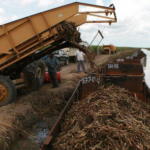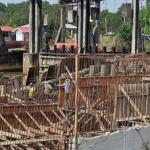(Source: UNDP-Guyana)
Supporting farmers in making informed decisions based on accurate, location-specific climate and weather information is a key objective of a five-day training of trainers workshop which commenced on November 5th, 2018. This workshop was held at the Bina Hill Institute in the North Rupununi, Upper Takutu-Upper Essequibo Region. This training was conducted as part of the “Project to Strengthen Disaster Management Capacity of Women in the Cooperative Republic of Guyana and Commonwealth of Dominica”, a three-year project funded by the Government of Japan, implemented by UNDP Guyana, in collaboration with the Ministry of Agriculture (Hydrometeorological Services), University of Reading, North Rupununi District Development Board (NRDDB) and St. Francis Community Developers.

Members of the UNDP Guyana CO Team and Mr. Toshihide Kanaya, Second Secretary of Embassy of Japan, along with representatives of the Ministry of Agriculture and residents of the focus communities during the PICSA training.
Twenty-four residents from fourteen neighboring villages, which are prone to the flooding and droughts, were invited to this training along with trainers from the Ministry of Agriculture. The tool used for this training, Participatory Integrated Climate Services for Agriculture (PICSA), helps farmers choose crop, livestock and livelihood options that are best suited to individual farmers’ circumstances based on the historical climate information and forecast.
In the commencement ceremony, Mr. Toshihide Kanaya, Second Secretary of Embassy of Japan based in Trinidad and Tobago remarked “Japan is pleased to support, in cooperation with UNDP, vulnerable communities specifically women and indigenous groups, to develop resilience to disaster and climate risk and build sustainable livelihoods in hazard-prone communities.”
Mr. Roberto Galvez, Deputy Resident Representative of UNDP Guyana, also emphasized the importance of building women’s capacity in disaster management by stating “it is a fact that disasters are occurring more frequently, therefore, communities must be prepared and have the required skills and knowledge to mitigate these adverse effects. As disasters affect men and women differently, gender roles should be taken into consideration for disaster risk reduction.”
Subsequently in the ceremony, Mr. Brian Allicock, Regional Chairman of the Upper Takutu-Upper Essequibo Region, who received previous training in PICSA, welcomed the team and explained how helpful the tool would be to the residents. Mr. Jason Chacon, Project Manager – Disaster Risk Management of UNDP gave the project overview and outlined UNDP’s plan to build resilience in communities. Lastly, Ms. Donessa David, Head of Agrometeorology of Hydrometeorological Services demonstrated key components of the PICSA tool and expected benefits to the participants.
The training was well-received by the participants; one of the participants, Ms. Jackie Allicock stated “if you want to empower women, the support from their partners and males in the community is critical. I look forward to sharing what I learn about gender and PICSA tool with the other community members.”
Several trainings are planned under this project to enhance farmers’ capacity to alleviate the impact of disaster and climate change.
For more information or media inquiries, please contact: Jason Chacon, Project Manager – DRM: jason.chacon@undp.org | 592-226-4040 Ext: 252





